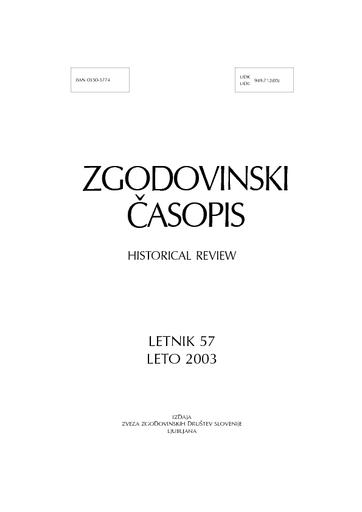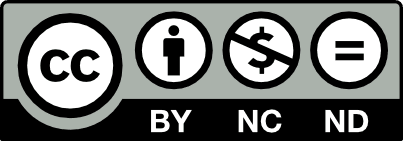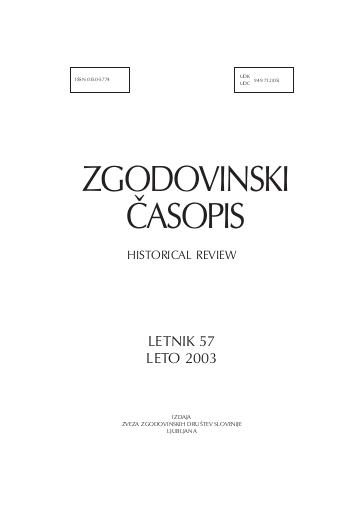
/
Periodicals
/
Zgodovinski časopis
Catholic Church and the Authorities in the 1980’s

Author(s):Božo Repe
Co-author(s):Peter Štih (odg. ur.)
Leto:2003
Publisher(s):Zveza zgodovinskih društev Slovenije, Ljubljana
Source(s):Zgodovinski časopis, 2003, št. 1-2
Language(s):slovenščina
Type(s) of material:text
Keywords:Katoliška cerkev, Slovenska zgodovina, Jugoslavija, politična oblast, 1980-1990, Catholic Church, Slovene history, Yugoslavia, political authorities, 1980-1990
Rights:

This work by Božo Repe is licensed under Creative Commons Attribution-NonCommercial-NoDerivs 4.0 International
Files (1)

Name:ZC_1-2_-_2003.pdf
Size:2.16MB
Format:application/pdf
Permanent link:https://hdl.handle.net/11686/file44
Description
The article focuses on the relation between the Slovene authorities and the Catholic Church in the
1980’s. Aside from other events, the 1980’s also denoted a marked turning point in the relation between
the Catholic Church and the state. The relationship between the socialist authorities and the Catholic
Church in the 1980’s still remained strained and strongly impeded by the bitter events of the past. Yet
it was mostly dialogical and characterized by partnership, and turned to be productive and beneficial
for the entire Slovene society. The authorities and the Church started to solve different questions in a
gradual manner, considering the current political situation, public opinion and the proportion of power
on both sides. Good relations with the Catholic Church and its support were very important for Slovene
socialist authorities squeezed between the demands of the opposition on one hand and the pressures
from Belgrade on the other. A more fighting stance of the Chuch, similar to the one in some East
European countries, would only aggravate the situation within Slovenia, limit the reformation movement
within the Slovene government, and hinder the soft transition to a multi-party sistem. It would also
arm Yugoslav authorities with additional arguments in favor of establishing the existence of the socalled
»counterrevolution« in Slovenia, and taking prompt action to supress it. The majority of Slovene
believers would not support such a relationship.
Metadata (12)
- identifierhttps://hdl.handle.net/11686/5267
- title
- Katoliška cerkev in oblast v osemdesetih letih
- Catholic Church and the Authorities in the 1980’s
- creator
- Božo Repe
- contributor
- Peter Štih (odg. ur.)
- subject
- Katoliška cerkev
- Slovenska zgodovina
- Jugoslavija
- politična oblast
- 1980-1990
- Catholic Church
- Slovene history
- Yugoslavia
- political authorities
- 1980-1990
- description
- The article focuses on the relation between the Slovene authorities and the Catholic Church in the 1980’s. Aside from other events, the 1980’s also denoted a marked turning point in the relation between the Catholic Church and the state. The relationship between the socialist authorities and the Catholic Church in the 1980’s still remained strained and strongly impeded by the bitter events of the past. Yet it was mostly dialogical and characterized by partnership, and turned to be productive and beneficial for the entire Slovene society. The authorities and the Church started to solve different questions in a gradual manner, considering the current political situation, public opinion and the proportion of power on both sides. Good relations with the Catholic Church and its support were very important for Slovene socialist authorities squeezed between the demands of the opposition on one hand and the pressures from Belgrade on the other. A more fighting stance of the Chuch, similar to the one in some East European countries, would only aggravate the situation within Slovenia, limit the reformation movement within the Slovene government, and hinder the soft transition to a multi-party sistem. It would also arm Yugoslav authorities with additional arguments in favor of establishing the existence of the socalled »counterrevolution« in Slovenia, and taking prompt action to supress it. The majority of Slovene believers would not support such a relationship.
- Članek obravnava odnose med oblastmi in Katoliško cerkvijo v osemdesetih letih v Sloveniji. Pisec ocenjuje, da so bila osemdeseta leta poleg dogajanja na drugih področjih tudi izrazita prelomnica v odnosih med Katoliško cerkvijo in državo. Razmerje med socialističnimi oblastmi in katoliško cerkvijo je bilo še vedno trdo in močno obremenjeno z grenkimi zgodovinskimi izkušnjami, a kljub temu pretežno dialoško in partnersko, ter v končni posledici produktivno in koristno za slovensko družbo v celoti. Oblast in cerkev sta probleme reševali postopno, ob upoštevanju političnih razmer, javnega mnenja in razmerja sil znotraj obeh strani. Za socialistično oblast, stisnjeno med zahteve opozicije in pritiske iz Beograda, sta bila dober odnos s Katoliško cerkvijo in njena podpora zelo pomembna. Bojevita opozicijska vloga cerkve po vzoru nekaterih vzhodnoevropskih držav bi razmere znotraj Slovenije mnogo bolj zaostrila, omejila reformatorsko strujo znotraj oblasti in otežila mehek prehod v večstrankarstvo, jugoslovanskim oblastem pa bi dala še dodatne argumente za oceno o »kontrarevoluciji« v Sloveniji in za možnost ukrepanja na tej podlagi. Takega odnosa vsaj v večini slovenski verniki ne bi podprli.
- publisher
- Zveza zgodovinskih društev Slovenije
- date
- 2003
- type
- besedilo
- language
- Slovenščina
- isPartOf
- rights
- license: ccByNcNd
Citirano v (1)
| Tipologija | Avtor(ji) | Naslov | Kraj | Založba | Leto |
|---|---|---|---|---|---|
| 2.01 Znanstvena monografija | Pacek, Dejan | Od konflikta h kompromisu : oris odnosa med državo in Katoliško cerkvijo v Sloveniji 1966-1991 | Ljubljana | Inštitut za novejšo zgodovino | 2023 |